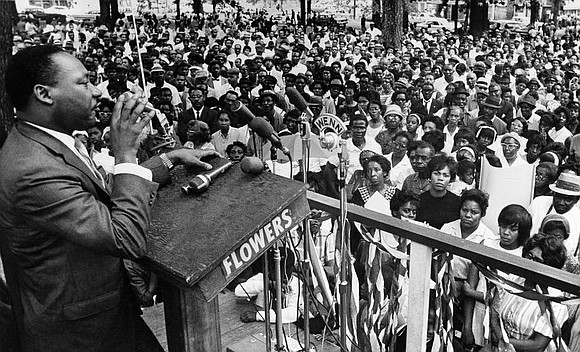What Shaped King’s Prophetic Vision?
Style Magazine Newswire | 1/18/2019, 5 p.m.
By Kenyatta R. Gilbert, Howard University, The Conversation
The name Martin Luther King Jr. is iconic in the United States. President Barack Obama spoke of King in both his Democratic National Convention nomination acceptance and victory speeches in 2008:
The name Martin Luther King Jr. is iconic in the United States. President Barack Obama spoke of King in both his Democratic National Convention nomination acceptance and victory speeches in 2008:
Indeed, much of King’s legacy lives on in such arresting oral performances. They made him a global figure.
King’s preaching used the power of language to interpret the gospel in the context of black misery and Christian hope. He directed people to life-giving resources and spoke provocatively of a present and active divine interventionist who summons preachers to name reality in places where pain, oppression and neglect abound.
In other words, King used a prophetic voice in his preaching – the hopeful voice that begins in prayer and attends to human tragedy. Indeed, the best of African-American preaching is three-dimensional – it is priestly, it is sage, it is prophetic.
So what led to the rise of the black preacher and shaped King’s prophetic voice?
In my book, “The Journey and Promise of African American Preaching,” I discuss the historical formation of the black preacher. My work on African-American prophetic preaching shows that King’s clarion calls for justice were offspring of earlier prophetic preaching that flowered as a consequence of the racism in the U.S.
From slavery to the Great Migration
First, let’s look at some of the social, cultural and political challenges that gave birth to the black religious leader, specifically those who assumed political roles with the community’s blessing and beyond the church proper.
In slave society, black preachers played an important role in the community: they acted as seers interpreting the significance of events; as pastors calling for unity and solidarity; and as messianic figures provoking the first stirrings of resentment against oppressors.
The religious revivalism or the Great Awakening of the 18th century brought to America a Bible-centered brand of Christianity – evangelicalism – that dominated the religious landscape by the early 19th century. Evangelicals emphasized a “personal relationship” with God through Jesus Christ.
This new movement made Christianity more accessible, livelier, without overtaxing educational demands. Africans converted to Christianity in large numbers during the revivals and most became Baptists and Methodists. With fewer educational restrictions placed on them, black preachers emerged in the period as preachers and teachers, despite their slave status.
Africans viewed the revivals as a way to reclaim some of the remnants of African culture in a strange new world. They incorporated and adopted religious symbols into a new cultural system with relative ease.
Rise of the black cleric-politician
Despite the development of black preachers and the significant social and religious advancements of blacks during this period of revival, Reconstruction – the process of rebuilding the South soon after the Civil War – posed numerous challenges for white slaveholders who resented the political advancement of newly freed Africans.
As independent black churches proliferated in Reconstruction America, black ministers preached to their own. Some became bivocational. It was not out of the norm to find pastors who led congregations on Sunday and held jobs as school teachers and administrators during the work week.
Others held important political positions. Altogether, 16 African-Americans served in the U.S. Congress during Reconstruction. For example, South Carolina’s House of Representatives’ Richard Harvey Cain, who attended Wilberforce University, the first private black American university, served in the 43rd and 45th Congresses and as pastor of a series of African Methodist churches.
Others, such as former slave and Methodist minister and educator Hiram Rhoades Revels and Henry McNeal Turner, shared similar profiles. Revels was a preacher who became America’s first African-American senator. Turner was appointed chaplain in the Union Army by President Abraham Lincoln.
To address the myriad problems and concerns of blacks in this era, black preachers discovered that congregations expected them not only to guide worship but also to be the community’s lead informant in the public square.




